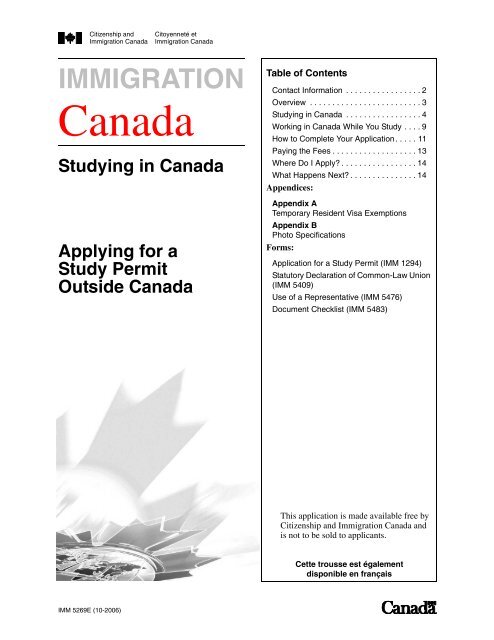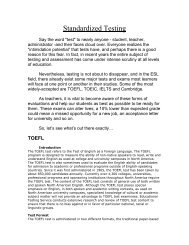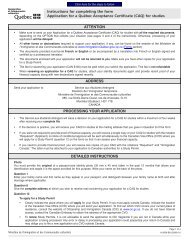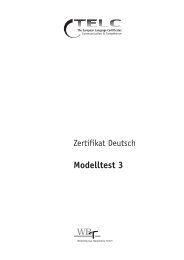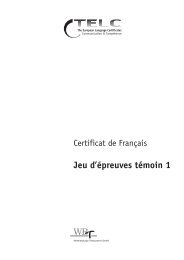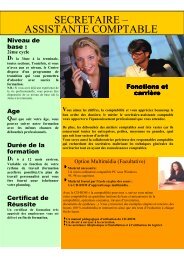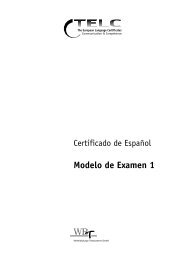Applying for a Study Permit outside Canada - Education Canada ...
Applying for a Study Permit outside Canada - Education Canada ...
Applying for a Study Permit outside Canada - Education Canada ...
Create successful ePaper yourself
Turn your PDF publications into a flip-book with our unique Google optimized e-Paper software.
Citizenship andImmigration <strong>Canada</strong>Citoyenneté etImmigration <strong>Canada</strong>IMMIGRATION<strong>Canada</strong><strong>Study</strong>ing in <strong>Canada</strong><strong>Applying</strong> <strong>for</strong> a<strong>Study</strong> <strong>Permit</strong>Outside <strong>Canada</strong>Table of ContentsContact In<strong>for</strong>mation . . . . . . . . . . . . . . . . . 2Overview . . . . . . . . . . . . . . . . . . . . . . . . . 3<strong>Study</strong>ing in <strong>Canada</strong> . . . . . . . . . . . . . . . . . 4Working in <strong>Canada</strong> While You <strong>Study</strong> . . . . 9How to Complete Your Application. . . . . 11Paying the Fees . . . . . . . . . . . . . . . . . . . 13Where Do I Apply? . . . . . . . . . . . . . . . . . 14What Happens Next? . . . . . . . . . . . . . . . 14Appendices:Appendix ATemporary Resident Visa ExemptionsAppendix BPhoto SpecificationsForms:Application <strong>for</strong> a <strong>Study</strong> <strong>Permit</strong> (IMM 1294)Statutory Declaration of Common-Law Union(IMM 5409)Use of a Representative (IMM 5476)Document Checklist (IMM 5483)This application is made available free byCitizenship and Immigration <strong>Canada</strong> andis not to be sold to applicants.Cette trousse est égalementdisponible en françaisIMM 5269E (10-2006)
Web siteContact In<strong>for</strong>mationFor more in<strong>for</strong>mation on the programs offered by Citizenship and Immigration <strong>Canada</strong>, visit our Web siteat www.cic.gc.ca. For some types of applications you can in<strong>for</strong>m us of a change of address and find out whatis happening with your application through on-line services on the Web site.Within <strong>Canada</strong>If you are in <strong>Canada</strong>, you can also phone our Call Centre. An automated telephone service is availableseven days a week, 24 hours a day and is easy to use if you have a touch-tone phone. You can listen topre-recorded in<strong>for</strong>mation on many programs, order application <strong>for</strong>ms, and <strong>for</strong> some types of applicationsthe automated service can even update you on the status of your case.When you call, have a pen and paper ready to record the in<strong>for</strong>mation you need. Listen carefully to theinstructions and press the number <strong>for</strong> the selection you want. At any time during your call, you may press*(the star key) to repeat a message, 9 to return to the main menu, 0 to speak to an agent, or 8 to end yourcall. If you have a rotary phone, wait <strong>for</strong> an agent to answer your call.If you need to speak to an agent, you must call Monday to Friday between 8 a.m. and 4 p.m. local time.From anywhere in <strong>Canada</strong>, call1-888-242-2100 (toll-free)Using a text telephone?Call our TTY service from Monday to Friday between 8 a.m. and 4 p.m. local time at: 1-888-576-8502(toll-free).Outside <strong>Canada</strong>If you are <strong>outside</strong> <strong>Canada</strong>, you can contact a Canadian embassy, high commission or consulate. Consult ourWeb site <strong>for</strong> addresses, phone numbers and Web site addresses of our visa offices.This is not a legal document. For legal in<strong>for</strong>mation, refer to the Immigration and RefugeeProtection Act and Regulations or the Citizenship Act and Regulations, as applicable.This publication is available in alternative <strong>for</strong>mats upon request.2 <strong>Study</strong>ing in <strong>Canada</strong>
OverviewThis application guide is designed <strong>for</strong> persons who wish to apply <strong>for</strong> a study permit from <strong>outside</strong> <strong>Canada</strong>,to study in <strong>Canada</strong>. It provides all of the necessary in<strong>for</strong>mation, instructions and application <strong>for</strong>ms <strong>for</strong> youto complete and submit.This guide does not provide general in<strong>for</strong>mation about renewing a study permit. For in<strong>for</strong>mation onrenewing a study permit refer to the guide <strong>Applying</strong> to Change Conditions or Extend Your Stay in <strong>Canada</strong>as a student (IMM 5552). The guide may be obtained by visiting our Web site or you can contact the CallCentre listed under the Contact In<strong>for</strong>mation section of this guide.Note: The Call Centre number is only accessible inside <strong>Canada</strong>.A renewal of a study permit does not affect your temporary resident visa. To obtain a temporary residentvisa, you must apply <strong>outside</strong> of <strong>Canada</strong>. It is your responsibility to ensure your temporary resident visaremains valid to re-enter <strong>Canada</strong>.If you want to study in <strong>Canada</strong> you must meet the necessary requirements and you may require a temporaryresident visa. A temporary resident visa is an official document issued by a visa office abroad, that is placedin your passport to show that you have met the requirements <strong>for</strong> admission to <strong>Canada</strong> as a temporaryresident. (See Appendix A Temporary Resident Visa Exemptions <strong>for</strong> in<strong>for</strong>mation on persons who areexempt from obtaining a temporary resident visa to visit <strong>Canada</strong>). If you require a temporary resident visait is not necessary to make a separate application or pay a separate fee; an officer will issue it at the sametime as the documentation necessary <strong>for</strong> your entry to <strong>Canada</strong> as a student.You must have a letter confirming that you have been accepted by an educational institution be<strong>for</strong>e youapply <strong>for</strong> a study permit. An educational institution includes a university, college or other educationalinstitution. The institution will decide if you meet its academic and language requirements. To obtain suchacceptance, you must deal directly with the educational institution in which you are interested.The entry of international students into <strong>Canada</strong> is regulated by the Government of <strong>Canada</strong>.Nevertheless, your admission to an educational institution may be subject to policies in the province orterritory where you want to study.Be<strong>for</strong>e You Apply• Read all the instructions carefully be<strong>for</strong>e you begin to complete the application <strong>for</strong>ms.• Gather all of the necessary documents.• Photocopy the blank <strong>for</strong>ms and use one as a working copy. Keep the working copy <strong>for</strong>your records.• Fill in the <strong>for</strong>ms carefully and completely. Use a typewriter or print clearly, in black ink.• Add appropriate characters <strong>for</strong> languages that do not use the Latin alphabet. (<strong>for</strong> example,Chinese, Arabic, Cyrillic, Japanese, Hebrew, etc.)• Sign and date your application <strong>for</strong>ms.• Verify acceptable methods of payment with the office where you submit your application.<strong>Study</strong>ing in <strong>Canada</strong> 3
<strong>Study</strong>ing in <strong>Canada</strong>What is a study permit?This is the official document issued by an officer that allows someone who is not a Canadian citizen orpermanent resident of <strong>Canada</strong> to study in <strong>Canada</strong>.Do I require a study permit?If you are not a Canadian citizen, a permanent resident of <strong>Canada</strong> or a family member of a <strong>for</strong>eignrepresentative accredited to <strong>Canada</strong> or a member of the armed <strong>for</strong>ces of a country that is a designated state<strong>for</strong> the purpose of the Visiting Forces Act, you must obtain a study permit to study in <strong>Canada</strong>. The ProtocolDivision of Foreign Affairs issues an acceptance to everyone who has diplomatic, consular, or official statusin <strong>Canada</strong> and their family members. If you have this approval, you do not need a study permit to takecourses in <strong>Canada</strong>.What courses do not require a study permit?A study permit is not needed <strong>for</strong>:• any program of study that is six months or less that can be completed within the periodauthorized upon entry into <strong>Canada</strong>;• courses that are not academic, professional or vocational in nature that can be completedwithin the period authorized upon entry into <strong>Canada</strong>;• courses included in tour packages as a secondary activity <strong>for</strong> tourists; and• nursery schools or kindergartens.If your program of study is six months or less but you intend to continue your studies in another programyou should apply <strong>for</strong> a study permit be<strong>for</strong>e coming to <strong>Canada</strong>. This will allow you to apply to extend yourstay as a student from within <strong>Canada</strong>. Otherwise, if you do not hold a study permit you will have to apply<strong>for</strong> one <strong>outside</strong> <strong>Canada</strong>.When should I apply?The time required to process an application to study in <strong>Canada</strong> may vary at different visa offices. You shouldapply as soon as you receive your letter of acceptance from the educational institution.What are the requirements I must meet?You must show the officer that you meet the requirements of the Canadian Immigration and RefugeeProtection Act and Regulations and that you will be in <strong>Canada</strong> <strong>for</strong> a temporary stay. You must also:• satisfy an officer that you will leave <strong>Canada</strong> at the end of your studies• have been accepted by an educational institution;• prove that you have enough money during your stay in <strong>Canada</strong> to pay <strong>for</strong>:· tuition fees;· living expenses <strong>for</strong> yourself and accompanying family members; and· return transportation <strong>for</strong> yourself and accompanying family members;4 <strong>Study</strong>ing in <strong>Canada</strong>
• be law abiding and have no record of criminal activity (you may be asked to provide aPolice Clearance Certificate);• not be a risk to the security of <strong>Canada</strong>;• produce any additional documents requested by the officer to establish your admissibility;• complete a medical examination, if required.What documents do I need to apply <strong>for</strong> a study permit?Complete the application <strong>for</strong>m, and include the documents listed below.Important: Although the documents listed below are normally needed in support of yourapplication, local requirements may also apply. You must satisfy an officer that you willleave <strong>Canada</strong>. Visit the local Web site of the visa office responsible <strong>for</strong> your area orcontact their office to verify all required documents, be<strong>for</strong>e submitting your application.1. Proof of acceptance• <strong>for</strong> attendance at a university, college or technical institution, a letter from the educationalinstitution to show:· the name of the institution;· confirmation of your acceptance and/or registration as a student;· the course of study;· the duration of the academic program; and· the latest date you may register.• <strong>for</strong> attendance at a primary or secondary school, a letter from the school board havingjurisdiction <strong>for</strong> the school you are attending (or <strong>for</strong> private schools, a letter from the schoolitself), indicating:· the name of the school;· the level of study; and· the duration of the course.2. Proof of identity• a valid passport or travel document that guarantees re–entry to the country that issued it(citizens and permanent residents of the United States, St. Pierre and Miquelon, andGreenland do not require a passport but do require proof of status and citizenship such as anational identity card or an alien registration card); and• two photos of you and your accompanying family members (see Appendix B PhotoSpecifications <strong>for</strong> instructions).3. Proof of financial support• evidence that you can support yourself and accompanying family members while youstudy in <strong>Canada</strong>. Such evidence may include:· proof of a Canadian bank account in your name if money has been transferred to<strong>Canada</strong>;· your bank statements <strong>for</strong> the past four months;· a bank draft in convertible currency;<strong>Study</strong>ing in <strong>Canada</strong> 5
· proof of payment of tuition and residence fees;· <strong>for</strong> those with a scholarship or those with a Canadian funded educational program:proof of funding paid from within <strong>Canada</strong>;• if <strong>for</strong>eign exchange control measures exist in your country, you must provide proof thatyou will be permitted by the exchange control authorities of your country to export funds<strong>for</strong> all of your expenses.In addition, note that:• if you are not a citizen of the country in which you are applying, you must provide proofof your present immigration status in the country of application;• if the government that issued your passport or travel document requires a re-entry permitthis must be obtained be<strong>for</strong>e you apply <strong>for</strong> a Canadian visa; and• additional documents may be required.Are there additional documents required if I’m attending aneducational institution in Quebec?Yes, you will also require a Certificat d’acceptation du Québec (Quebec Certificate of Acceptance, or CAQ)issued by the Ministère de l’Immigration et des communautés culturelles (MICC) prior to requesting yourstudy permit at the Canadian visa office.Your educational institution should give you all necessary in<strong>for</strong>mation about the procedures that apply inQuebec. For residents of some countries where there is a Quebec Immigration Service or SIQ (such asFrance, Austria, Mexico or the Hong Kong Administrative Region) you should apply there <strong>for</strong> your CAQ.Otherwise, you should send your application to the MICC Regional office that serves your educationalinstitution in Quebec (or, if the institution is in the Montreal area, through the Direction des servicesd'immigration sociale et humanitaire in Montreal).Refer to the MICC Web site <strong>for</strong> appropriate contact in<strong>for</strong>mation and <strong>for</strong> the latest updates on the processand documents required in Quebec.Note: Certain persons do not require a CAQ. Visit the MICC Web site at: www.immigrationquebec.gouv.qc.ca/en/immigrate-settle/international-students/obtainingauthorizations/requirements/list-exemptions.html<strong>for</strong> a complete list of persons whodo not require a CAQ.Minor children who are travelling alone must have in<strong>for</strong>mation (name, address, phone number) aboutthe person or school who will be responsible <strong>for</strong> them. If the child is the subject of a custody order, proofof custody and the other parent’s consent must also be provided. Minors travelling without their parentsrequire a letter of permission from the non-accompanying parent(s) and a letter from their custodian in<strong>Canada</strong>.Children coming to <strong>Canada</strong> to study require a custodianship <strong>for</strong>m until they are of legal age of theprovince of destination. Legal age varies from one province to another. Children under 18 years ofage in Alberta, Manitoba, Ontario, Prince Edward Island, Quebec and Saskatchewan will require acustodianship <strong>for</strong>m.Children under 19 years of age in British Columbia, New Brunswick, Newfoundland, Nova Scotia,Northwest Territories, Nunavut and the Yukon will require a custodianship <strong>for</strong>m.Custodianship <strong>for</strong>ms may be obtained by visiting our Web site at: www.cic.gc.ca/english/pdf/pub/custodian-parent.pdf.6 <strong>Study</strong>ing in <strong>Canada</strong>
Are there any conditions on my study permit?An officer may impose, vary, or cancel conditions on your study permit. These may include one or more ofthe following:• the type of studies or course you may take• the educational institution you may attend• the location of your studies• the time and period of your studies• the time and place at which you shall report <strong>for</strong> medical examination or observation• the time and place at which you shall report <strong>for</strong> the presentation of evidence in compliancewith applicable conditions• the prohibition of engaging in employment• the duration of your stay in <strong>Canada</strong>May my spouse or common law partner and dependent childrenaccompany me to <strong>Canada</strong>?Yes. They may either accompany you to <strong>Canada</strong> or they may join you at a later date.Family members are the immediate members of your family. Your spouse or common-law partner and yourdependent children are your family members. A common-law partner is a person of the opposite or samesex who is currently cohabiting and has cohabited in a conjugal relationship with you <strong>for</strong> a period of at leastone year.A child must meet the requirements of type A, B or C below to be considered a dependent child:Type AHe or she is under the age of 22 and single, that is, not married and not in a common-law relationship.Type BHe or she married or entered into a common-law relationship be<strong>for</strong>e the age of 22 and, since becominga spouse or a common-law partner, has• been continuously enrolled and in attendance as a full-time student in a post-secondaryinstitution accredited by the relevant government authority; and• depended substantially on the financial support of a parent.orHe or she is 22 years of age or older and, since be<strong>for</strong>e the age of 22, has• been continuously enrolled and in attendance as a full-time student in a post-secondaryinstitution accredited by the relevant government authority; and• depended substantially on the financial support of a parent.Type CHe or she is 22 years of age or older, has depended substantially on the financial support of a parentsince be<strong>for</strong>e the age of 22 and is unable to provide <strong>for</strong> him/herself due to a medical condition.Your spouse or common-law partner and children must meet all the requirements <strong>for</strong> temporary residents in<strong>Canada</strong>. They must satisfy an officer that they are genuine temporary residents who will be in <strong>Canada</strong> <strong>for</strong> atemporary stay. They may be required to provide evidence that they are law abiding and have no criminal<strong>Study</strong>ing in <strong>Canada</strong> 7
ecord. If your family member applies <strong>for</strong> a temporary resident visa, they must also meet all the conditionsto obtain a visa.Include them on your application by providing their names and other in<strong>for</strong>mation in the appropriate spaceon the application <strong>for</strong>m.Important: You may be required to provide a marriage certificate and birth certificates <strong>for</strong> anyaccompanying family members. If you are in a common-law relationship and your common-law partnerwill accompany you to <strong>Canada</strong>, you may be required to complete the enclosed <strong>for</strong>m StatutoryDeclaration of Common-Law Union (IMM 5409). Also provide evidence outlined on the <strong>for</strong>m tosupport your relationship.If your family members wish to follow you to <strong>Canada</strong> at a later date, they must make a separate application<strong>for</strong> admission.May my children attend school?Your accompanying children may be able to study in <strong>Canada</strong>. They must apply <strong>for</strong> a study permit at the sametime of your application. If they intend to join you later they must obtain a study permit be<strong>for</strong>e coming to<strong>Canada</strong> to join you.Will I or my family members need a medical examination?In some cases you will require a medical examination. If a medical examination is required, you will bein<strong>for</strong>med by an officer who will provide instructions on how to proceed. It may add over three months tothe processing of your application.May I leave, then re-enter <strong>Canada</strong>?In order to return to <strong>Canada</strong>, you must be in possession of a valid passport or travel document. You also needto hold a valid study permit if you are returning to study in <strong>Canada</strong>.If you are a citizen of a country that requires a temporary resident visa to travel to <strong>Canada</strong>, you will alsoneed to be in possession of a valid entry visa to return, unless:• you are returning to <strong>Canada</strong> following a visit only to the United States or St-Pierre andMiquelon; and• you return be<strong>for</strong>e the expiry of the period initially authorized <strong>for</strong> your entry or anyextension to it, either as a visitor, student or worker.Possession of these documents does not guarantee re-entry. All persons must establish that they meet all ofthe requirements of The Immigration and Refugee Protection Act and Regulations be<strong>for</strong>e being authorizedto enter or re-enter <strong>Canada</strong>.Note: Citizens of the United States do not require passports or travel documents to enter orreturn to <strong>Canada</strong>. Permanent residents of the U.S. do not require passports or traveldocuments if they are entering or returning to <strong>Canada</strong> from the U.S. or St. Pierre andMiquelon. However, both must provide documentary proof of citizenship or permanentresidence, such as a national identity card or an alien registration card.8 <strong>Study</strong>ing in <strong>Canada</strong>
Working in <strong>Canada</strong> While You <strong>Study</strong>May I work during my stay in <strong>Canada</strong>?Generally, <strong>for</strong>eign students are not allowed to work while studying in <strong>Canada</strong>.However, there are some exceptions <strong>for</strong> full-time students at publicly funded or degree granting institutionswho may apply <strong>for</strong> work permits. A full-time student is a person whose program of study is normally at least15 hours of instruction per week, leading to a diploma or certificate, unless otherwise defined by aneducational institution. (Note: The definition of a full-time student varies from one educational institutionto another and you should refer to the guidelines of your educational institution to ensure you are considereda full-time student.) A work permit is issued if it is established that:• the intended employment is an essential and integral part of your course of study (this doesnot apply to medical interns or medical residents); or• the intended employment is related to an approved research or training program; or• you hold a study permit and have become temporarily destitute through circumstancesbeyond your control or beyond the control of any person whom you are dependent on <strong>for</strong>financial support to complete your term of study. You must show proof that you are notable to obtain the money needed <strong>for</strong> daily expenses and that it is a temporarysituation.• you have successfully graduated from a program at a Canadian university, community,college, CÉGEP, or publicly funded trade/technical school (or from a Canadian privateinstitution authorized by provincial statute to confer degrees) and wish to work <strong>for</strong> amaximum of one or two years in employment related to your course of study. Themaximum length will depend on the length and location of your studies, and the locationof your employer. You must submit your application <strong>for</strong> a work permit within 90 days ofthe issuance of your final marks. Your study permit must be valid upon submission of yourapplication <strong>for</strong> a work permit. For further details refer to the Foreign Workers Manual (seepost-graduation employment) located on our Web site or contact the Call Centre listedunder the Contact In<strong>for</strong>mation section.• Spouses and common-law partners of full-time students at publicly funded or degree/diploma granting institutions can apply <strong>for</strong> an open work permit. For further details referto the guide <strong>Applying</strong> to Change Conditions or Extend Your Stay in <strong>Canada</strong> as a Worker(IMM 5553).The guide may be obtained by visiting our Web site or contact the CallCentre listed under the Contact In<strong>for</strong>mation section.Note: Some study permits are arranged with the Canadian International Development Agency(CIDA). These students must obtain an approval letter from CIDA to be eligible <strong>for</strong> awork permit related to their course of study.Note: If you are currently a full-time student at certain public post-secondary institutions, youmay be eligible to apply <strong>for</strong> a work permit that allows you to work off-campus. This willdepend on whether your province and institution have signed agreements to implement theprogram. Currently, off-campus work permits are available in Manitoba, New Brunswickor some regions of Quebec. Contact your international student advisor to get morein<strong>for</strong>mation about the program, the number of hours you can work and the applicationprocess, or refer to the CIC Web site.Do students need a work permit to work on campus?A full-time student attending a degree-granting post-secondary institution does not need a work permitwhen the employment offered is on the campus of the college or university where the student is registered<strong>Study</strong>ing in <strong>Canada</strong> 9
full-time, <strong>for</strong> as long as the study permit is valid. The employer may be a private contractor operating on thecampus.Are there medical restrictions on the work I seek?Yes, there are some restrictions on the jobs you can take based on the following medical factors:• if you have passed an immigration medical examination, you may work in any type of job;• if you have passed an immigration medical examination with some restriction, you maywork but you may not take a job involving child care, primary or secondary teaching orhealth services;• if you come from a country that Health <strong>Canada</strong> says has a high rate of seriouscommunicable diseases, you may not work in certain agricultural jobs, childcare, primaryor secondary teaching and health services fields, unless you have passed an immigrationmedical examination.10 <strong>Study</strong>ing in <strong>Canada</strong>
How to Complete Your ApplicationThe documentation you provide will be used to establish that your authorization to remain in <strong>Canada</strong>would not be contrary to the Act. Failure to provide complete, truthful and accurate material will result inyour application being assessed based on the documentation submitted, which may result in yourapplication being refused.To complete your application you will need to know the cost of your education including tuition fees andbooks, medical insurance, return transportation costs and living costs <strong>for</strong> yourself and any family memberswhile in <strong>Canada</strong>. Living costs vary in each province.As most of the <strong>for</strong>m is self-explanatory, supplementary instructions have only been provided whennecessary. Follow the numbered instructions which correspond to the application <strong>for</strong>m, carefully. Yourapplication will be returned to you if it is not properly completed, or if all of the necessary documentshave not been submitted. Attach a separate sheet of paper if you need more space and indicate the letteror number of the question you are answering.Application <strong>for</strong> a <strong>Study</strong> <strong>Permit</strong> (IMM 1294)1. Print your name under the applicant section and provide the in<strong>for</strong>mation requested <strong>for</strong> each ofyour family members. You must provide details about each of your family members and indicatewhether they will be accompanying you to <strong>Canada</strong>. If you have more than three family members,photocopy the first page of the application be<strong>for</strong>e you start completing it. Make enough copies tofill in details about all your family members. Print all names as they appear on the passport oridentity document. Do not use initials.2. Provide your current mailing address, telephone number, and fax number. All correspondence willbe sent to this address.Note: If you wish to authorize a Canadian representative to receive correspondence concerningyour application, indicate their address in this box and on the <strong>for</strong>m Use of a Representative(IMM 5476).3. Provide your residential address if different from your mailing address.4. Provide the name of your present job. Briefly describe your position.5. Print the name and address of your present employer or school.6. a) Provide details of your immigration status in the country in which you are applying- this maybe temporary resident, student, worker, permanent resident or citizen.b) Print the expiry date of your temporary status in the country where you are making yourapplication.7. Provide the full name and complete address of the educational institution you will be attendingwhile in <strong>Canada</strong>. Attach an original letter of acceptance from the educational institution.8. Provide the name of your course and its level. For example, Bachelor of Arts in History.9. Provide the date your course in <strong>Canada</strong> will start and the date it will finish. (For example, <strong>for</strong> afour year program of study you would indicate 05/10/2002 until 30/04/2006.)10. Provide the total cost of your education and living expenses while in <strong>Canada</strong>.11. Provide details of funds available to you and your family members while in <strong>Canada</strong>. Indicate whowill be paying your expenses. If you will be receiving any scholarships, bursaries or grants, place<strong>Study</strong>ing in <strong>Canada</strong> 11
an “X” in the box “Other” and give details. Attach proof of funds available such as a bankstatement, or a letter from the bank stating how much money you have in your bank account. Theletter must indicate your name and account number.12. Each question in this section must be answered <strong>for</strong> each applicant. Place an “X” in the yes or nobox. If you answer "yes" to any of the questions from 12 c) to g), give the name of the person withan explanation in the space marked "related in<strong>for</strong>mation".13. Print an “X” in the box which applies to you or any accompanying family member. Provide thename of the countries and length of stay <strong>for</strong> each accompanying member.14. You must sign and date the application. Failure to do so will result in it being returned to you.Use of a Representative (IMM 5476)Complete this <strong>for</strong>m if you are appointing a representative.If you have dependent children aged 18 years or older, they are required to complete their own copy of this<strong>for</strong>m if a representative is also conducting business on their behalf.A representative is someone who has your permission to conduct business on your behalf with Citizenshipand Immigration <strong>Canada</strong>. When you appoint a representative, you also authorize CIC to share in<strong>for</strong>mationfrom your case file to this person.You are not obliged to hire a representative. We treat everyone equally, whether they use the services of arepresentative or not. If you choose to hire a representative, your application will not be given specialattention nor can you expect faster processing or a more favourable outcome.The representative you appoint is authorized to represent you only on matters related to the application yousubmit with this <strong>for</strong>m. You can appoint only one representative <strong>for</strong> each application you submit.There are two types of representatives:Unpaid representatives• friends and family members who do not charge a fee <strong>for</strong> their advice and services• organizations that do not charge a fee <strong>for</strong> providing immigration advice or assistance (suchas a non-governmental or religious organization)• consultants, lawyers and Québec notaries who do not, and will not, charge a fee torepresent youPaid representativesIf you want us to conduct business with a representative who is, or will be charging a fee to representyou, he or she must be authorized. Authorized representatives are:• immigration consultants who are members in good standing of the Canadian Society ofImmigration Consultants (CSIC)• lawyers who are members in good standing of a Canadian provincial or territorial lawsociety and students-at-law under their supervision• notaries who are members in good standing of the Chambre des notaires du Québec andstudents-at-law under their supervisionIf you appoint a paid representative who is not a member of one of these designated bodies, yourapplication will be returned. For more in<strong>for</strong>mation on using a representative, visit our Web site.12 <strong>Study</strong>ing in <strong>Canada</strong>
is considered as “processing” and the fee will not be refunded. If you apply again, you will have to payanother processing fee.Paying the feesContact the local Web site of the visa office responsible <strong>for</strong> your area, <strong>for</strong> in<strong>for</strong>mation on fees and methodsof payments. Visa offices cannot accept fee payment receipts from banks in <strong>Canada</strong>.Note: Personal cheques are not acceptable methods of payment.Where Do I Apply?You must submit your application to the Canadian visa office responsible <strong>for</strong> your area, <strong>for</strong> processing.Consult the relevant visa office or its Web site regarding accepted methods of submitting applications (suchas general mail, in person, by courier etc.).Note: If you are from the U.S.A., Greenland, or St. Pierre and Miquelon, you can apply at aCanadian port of entry.What Happens Next?Your application will be reviewed to ensure it has been completed correctly and contains all of the requireddocuments <strong>for</strong> processing.After reviewing your application, an officer will decide if an interview is necessary. If so, the officer willin<strong>for</strong>m you of the time and place.If your application is approved, you will receive a letter of introduction confirming the approval. This letteris not your study permit. When you arrive in <strong>Canada</strong>, you must show this letter to a Canadian officer at theport of entry. The officer will determine whether you may enter <strong>Canada</strong> and how long you may stay. Youwill be issued a study permit at this time. You must leave <strong>Canada</strong> on or be<strong>for</strong>e the date on your study permit,set by the officer or have your status extended by an officer in <strong>Canada</strong>.If you move or change your address, telephone or fax number be<strong>for</strong>e your application has beenprocessed, you must advise us of this new in<strong>for</strong>mation by contacting the visa office where you submittedyour application.When you apply <strong>for</strong> your study permit, there is no guarantee of acceptance. We do not recommend thatyou make any final steps, such as purchasing plane tickets or quitting your job, until your study permit isapproved.14 <strong>Study</strong>ing in <strong>Canada</strong>
Appendix ATemporary Resident Visa Exemptions*Persons who do not require a visa to visit <strong>Canada</strong> include:* Subject to change at any time• citizens of Andorra, Antigua and Barbuda, Australia, Austria, Bahamas, Barbados,Belgium, Botswana, Brunei Darussalam, Cyprus, Denmark, Estonia, Finland, France,Republic of Germany, Greece, Iceland, Ireland, Israel (National Passport holders only),Italy, Japan, Liechtenstein, Luxembourg, Malta, Mexico, Monaco, Namibia, Netherlands,New Zealand, Norway, Papua New Guinea, Portugal, Republic of Korea, St. Kitts andNevis, St. Lucia, St. Vincent, San Marino, Singapore, Solomon Islands, Spain, Swaziland,Sweden, Slovenia, Switzerland, United States, and Western Samoa;• persons lawfully admitted to the United States <strong>for</strong> permanent residence who are inpossession of their alien registration card or can provide other evidence of permanentresidence;• British citizens and British Overseas Citizens who are re-admissible to the UnitedKingdom;• citizens of British dependent territories who derive their citizenship through birth, descent,registration or naturalization in one of the British dependent territories of Anguilla,Bermuda, British Virgin Islands, Cayman Islands, Falkland Islands, Gibraltar, Montserrat,Pitcairn, St. Helena or the Turks and Caicos Islands;• persons holding a valid and subsisting Special Administrative Region passport issued bythe Government of the Hong Kong Special Administrative Region of the People’sRepublic of China; and• persons holding passports or travel documents issued by the Holy See.<strong>Study</strong>ing in <strong>Canada</strong> A - 1
Appendix BPhoto SpecificationsRequirementsTAKE THIS SHEET WITH YOU TO THE PHOTOGRAPHERProvide two photos of you and each accompanying family member with your application.Your photos must comply with the specifications below. If the photos do not meet the specifications, youwill have to provide new photos be<strong>for</strong>e your application can be processed.Specifications• The photos must be identical and taken within the last six months. They may be eitherblack and white or colour.• The photos must be clear, well defined and taken against a plain white or light-colouredbackground.• If the photos are digital, they must not be altered in any way.• Your face must be square to the camera with a neutral expression, neither frowning norsmiling, and with your mouth closed.• You may wear non-tinted or tinted prescription glasses as long as your eyes are clearlyvisible. Make sure that the frame does not cover any part of your eyes. Sunglasses are notacceptable.• A hairpiece or other cosmetic accessory is acceptable if it does not disguise your normalappearance.• If you must wear a head covering <strong>for</strong> religious reasons, make sure your full facial featuresare not obscured.The frame size must be 35 mm X 45 mm (1 3/8" X 1 3/4").The photos must show the full front view of the head, with theface in the middle of the photo, and include the top of theshoulders.The size of the head, from chin to crown, must be between31 mm (1 1/4") and 36 mm (1 7/16").Crown means the top of the head, or (if obscured by hair or ahead covering), where the top of the head or skull would be if itcould be seen.Min. Face Height 31 mmMax. Face Height 36 mmFrame Height 45 mmFrame Width 35 mmTo avoid delays, make sure your photos meet these specifications.<strong>Study</strong>ing in <strong>Canada</strong> B - 1


